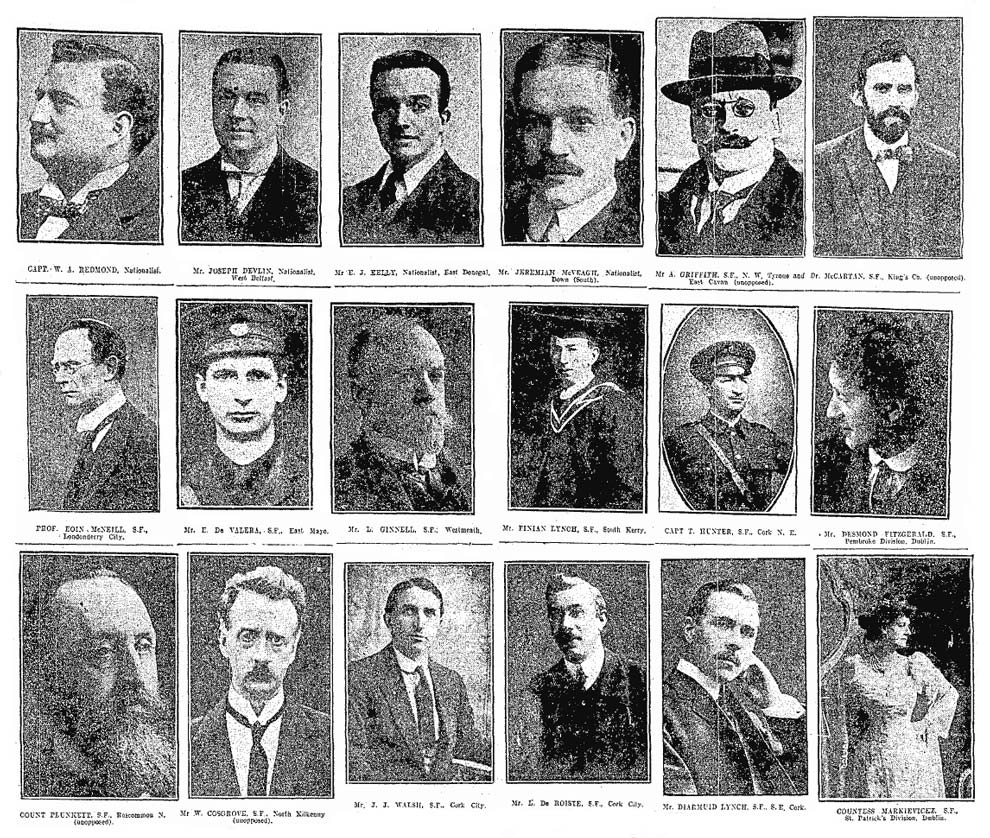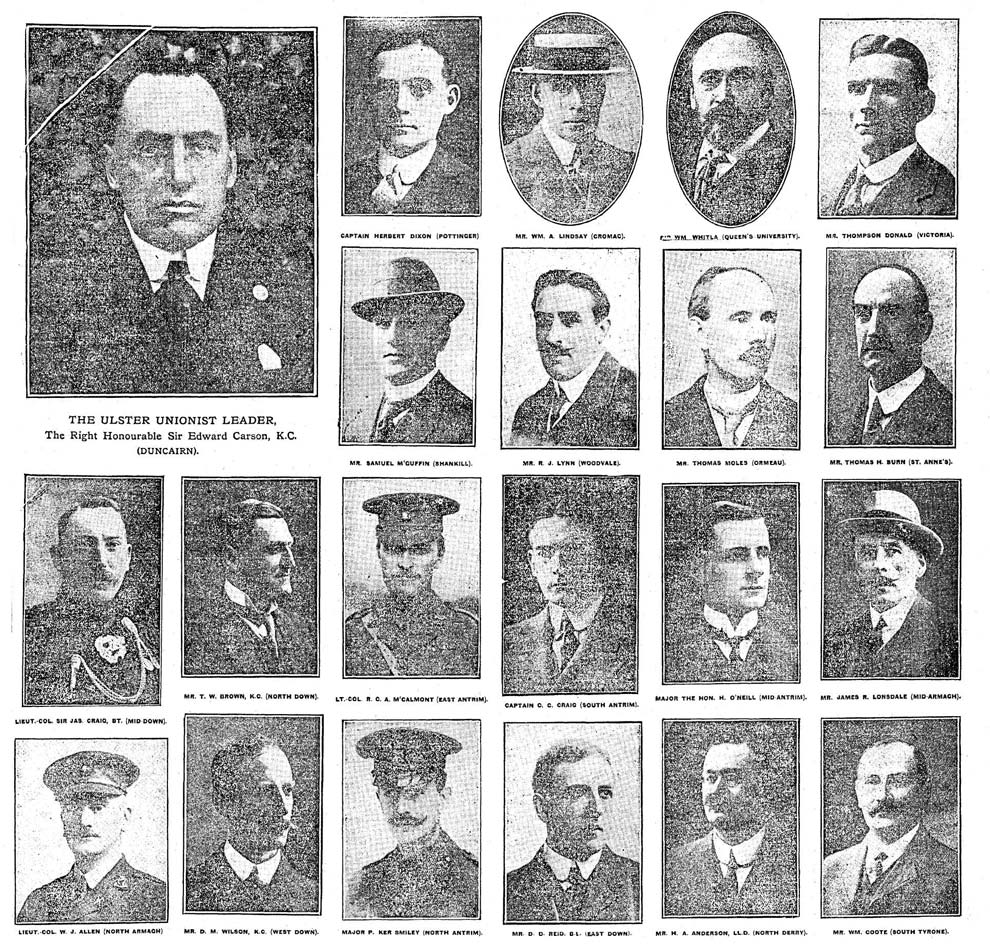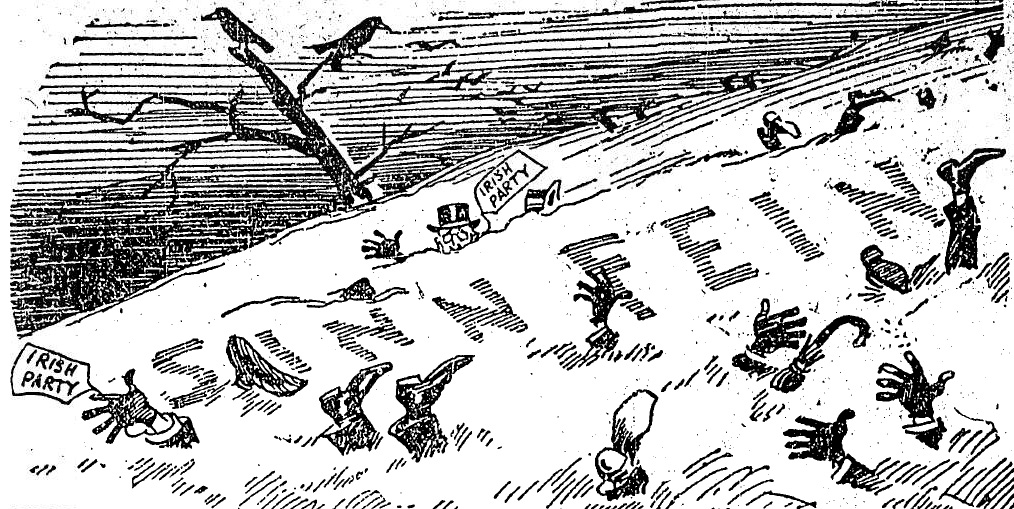Election Results 1918 – what the papers say
Cork, 31 December 1918 - The scale of the electoral shakeup delivered by Irish voters has been the subject of many newspaper editorials in recent days.
‘With the suddenness of a thunder-clap the electors have spoken their minds’, the Cork Examiner has observed, ‘and many distinguished figures as a consequence have, for the moment at all events, disappeared from the political arena. Chief amongst these are Mr Dillon and Mr Asquith.’
In the Irish context, the big winner is Sinn Féin but they are now faced with a ‘gigantic task’, the Cork Examiner suggests. ‘For the first time it has an opportunity of showing what constructive faculty it possesses.’

Successful Irish Party and Sinn Féin candidates (Image: Cork Examiner, 30 Dec 1918)
Perhaps somewhat fancifully, the paper’s editorial suggests that the Irish Parliamentary Party will, not only ‘harbour no bitterness’ towards the party that displaced them as the voice of Irish nationalism, but will get behind the new movement:
‘Young Ireland takes control with the best wishes of old Ireland, and if they can bring peace and happiness and goodwill to our people, none will bless them more fervently or hail their triumph with greater acclaim than those who have maintained the struggle through long and dark and evil days. May God grant that affairs will work out better for poor Ireland than they look at the moment as a result of the “Victory” elections.’
As for the Irish Times, it describes the Irish Party’s defeat as ‘crushing and final’. Speaking of the relative failure of both the Liberals and the IPP in the election the paper wrote: ‘If Mr Asquith’s Liberals could go back to parliament on a big aeroplane, the Nationalists could go back on an Irish jaunting-car.’
The Irish Party-aligned Freeman’s Journal, states that the nationalist party has, ‘for the time being, practically ceased to exist as a parliamentary force’. The newspaper accepts that the Sinn Féin demand for a separate republic was clearly placed before the people and they, in turn, had given an ‘unmistakable answer’.
However, the newspaper is still convinced of the unattainability of the Sinn Féin aims. ‘We remain of the opinion that an independent Irish republic is not within the field of practicable politics, or within measurable distance of that field and we are equally convinced that the freedom of Ireland cannot be extended or advanced by the methods of Sinn Féin’.

Some of the victorious Ulster unionist candidates (Image: Belfast Newsletter, 30 December 1918)
The unionist Belfast Newsletter maintains that with the triumph of Sinn Féin the ‘cleavage is no longer between the maintenance of the Union and the imposition of Home Rule... Separation and an independent sovereignty are now openly avowed to be the aim of the Irish agitation. We have all along contended that this was the ultimate objective of the agitators in the past. Now it cannot be denied...’
Against this separatist demand stands the Ulster Unionist Party, which the Belfast Newsletter continues, ‘stands solid for the maintenance of the union, but with an important modification in the methods by which that policy is to be pursued. The old purely defensive, negative policy is abandoned. It gives way to an offensive and positive policy of claiming for Ulster, as Sir Edward Carson has put it, that it shall be governed and treated as Great Britain is, and shall share the benefits of all the remedial legislation passed for Great Britain.’
Dismissing the policy and objectives of Sinn Féin as ‘pure delusion’, the Newsletter lauds the new aggressive policy of Ulster unionism and adds, pointedly, that Irish unionists as a whole ‘need not trouble themselves how the crisis inside Irish nationalism... works out, since their own position and their cause are stronger today than at any period since 1880, and the prospect far more promising’.
[Editor's note: This is an article from Century Ireland, a fortnightly online newspaper, written from the perspective of a journalist 100 years ago, based on news reports of the time.]





















